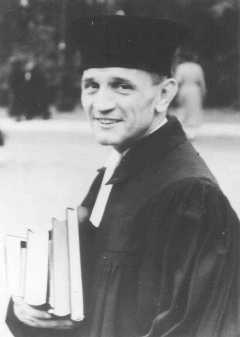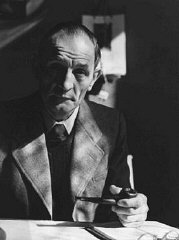Note: The regret of Niemoller - "in particular, he believed, the leaders of the Protestant churches -- had been complicit through their silence in the Nazi imprisonment, persecution, and murder of millions of people" - is something I often think about today, relating it to the fact that the majority of world leaders side with the Arab Palestinians and the Muslim world, while using Israel as the scapegoat for a lack of peace in the Middle East. In the past 63 years, has anything changed regarding the Jewish people and the one Jewish nation in the entire world? ... Not much! However, those same Muslim nations are now persecuting and driving out the Christians from Iraq, Pakistan, Iran, Egypt ... wherever Muslims are the majority and rule under their Sharia laws. .... How fitting it is to remind ourselves of the poem by Martin Niemoller.

Martin Niemöller, a prominent Protestant pastor who opposed the Nazi regime. He spent the last 7 years of Nazi rule in concentration camps. Germany, 1937.
— Bildarchiv Preussischer Kulturbesitz
Martin Niemöller (1892-1984) was an ardent nationalist and prominent Protestant pastor who emerged as an outspoken public foe of Adolf Hitler and spent the last 7 years of Nazi rule in concentration camps.
Niemöller is perhaps best remembered for the quotation:
First they came for the Socialists, and I did not speak out --
Because I was not a Socialist.
Because I was not a Socialist.
Then they came for the Trade Unionists, and I did not speak out --
Because I was not a Trade Unionist.
Because I was not a Trade Unionist.
Then they came for the Jews, and I did not speak out --
Because I was not a Jew.
Because I was not a Jew.
Then they came for me -- and there was no one left to speak for me.
The quotation stems from Niemöller's lectures during the early postwar period. Different versions of the quotation exist. These can be attributed to the fact that Niemöller spoke extemporaneously and in a number of settings. Much controversy surrounds the content of the poem as it has been printed in varying forms, referring to alternating groups such as Catholics, Jehovah's Witnesses, Jews, Trade Unionists or Communists depending upon the version. Nonetheless his point was that Germans -- in particular, he believed, the leaders of the Protestant churches -- had been complicit through their silence in the Nazi imprisonment, persecution, and murder of millions of people.
At the same time, however, Niemöller, like most of his compatriots, was largely silent about the persecution and mass murder of the European Jews. Only in 1963, in a West German television interview, did Niemöller acknowledge and make a statement of regret about his own antisemitism (see Gerlach, 2000, p. 47).
Further Reading
James Bentley, Martin Niemöller: 1892-1984 (NY: Macmillan Free Press,1984)
Victoria Barnett, For the Soul of the People: Protestant Protest under Hitler (NY: Oxford University Press, 1992)
Wolfgang Gerlach, And the Witnesses were Silent: The Confessing Church and the Jews (Lincoln, Nebraska: University of Nebraska Press, 2000)
Related Articles:
Martin Niemöller: Biography »
German Churches and the Nazi State »
Non-Jewish Resistance: Overview »
German Churches and the Nazi State »
Non-Jewish Resistance: Overview »
- This melody was composed by a famous Rabbi who was transported to Treblinka himself. It was composed on the way while he was in one of those terrible cattle trains. This was a song that people were also praying when they were taken to the gas chambers, The name of this Rabbi was David Azrieli Pasteg. May his memory be blessed and all of our brothers who died in the holocaust.
- This song was composed by a young man on the cattle-train to the death camps. He taught it to two young men and asked them to "bring it" to his rabbi(of Modzhiz). The two succeeded to jump off and the train.They survived the war and kept their promise - came to America and sang it to that man's rabbi. The rabbi burst in crying. Though he never heard the song before, he recognised who made it. That young man perished in the Holocaust, but his song and his spirit live on. Yehe zichro baruch.

